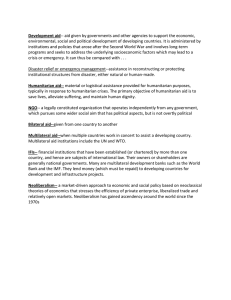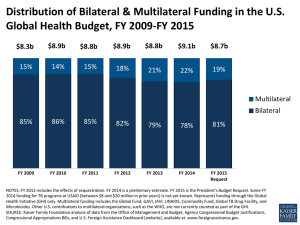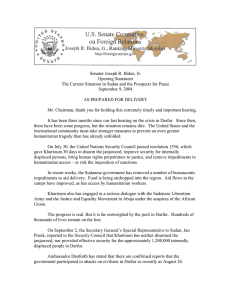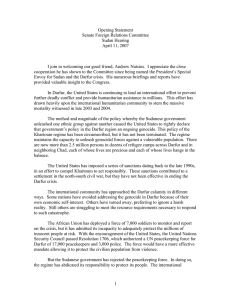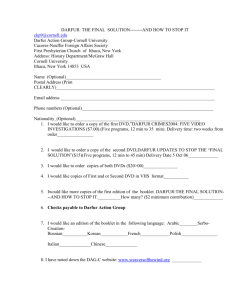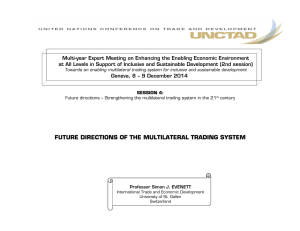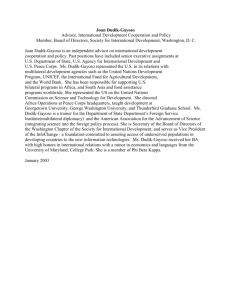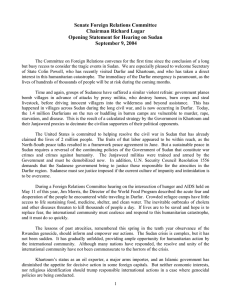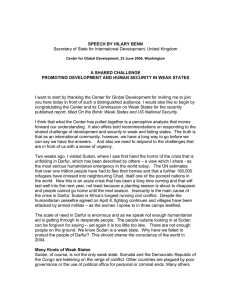Multiple Principles for Multilateral Interventions: The Ideational Divergences between EU and China
advertisement
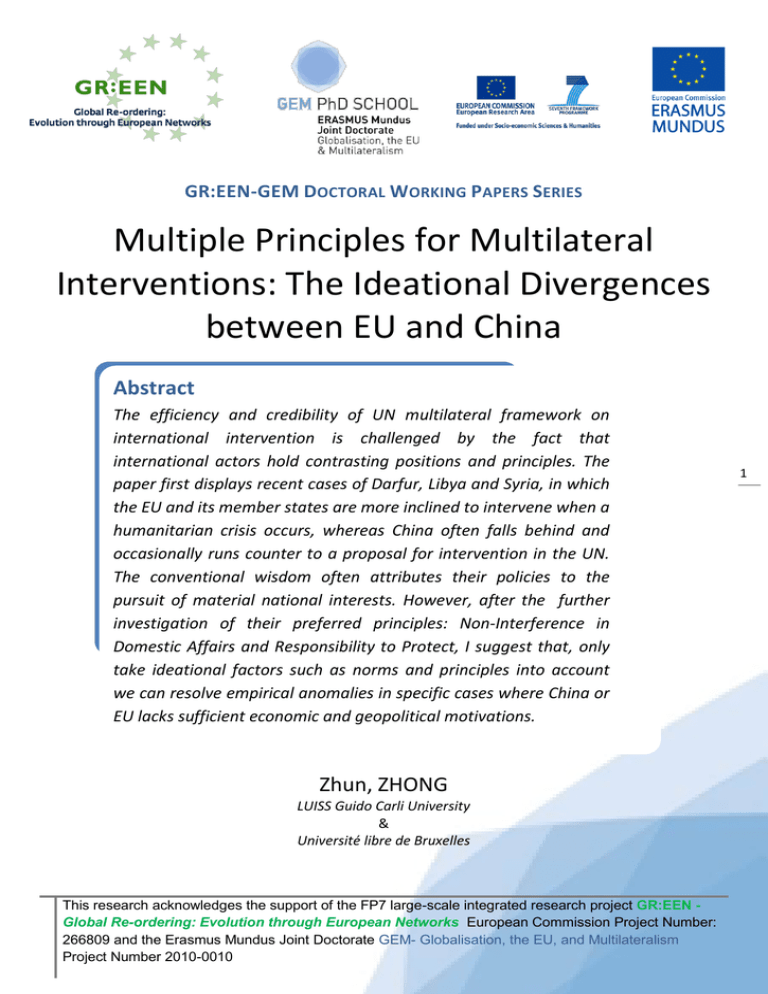
GR:EEN-GEM DOCTORAL WORKING PAPERS SERIES Multiple Principles for Multilateral Interventions: The Ideational Divergences between EU and China Abstract The efficiency and credibility of UN multilateral framework on international intervention is challenged by the fact that international actors hold contrasting positions and principles. The paper first displays recent cases of Darfur, Libya and Syria, in which the EU and its member states are more inclined to intervene when a humanitarian crisis occurs, whereas China often falls behind and occasionally runs counter to a proposal for intervention in the UN. The conventional wisdom often attributes their policies to the pursuit of material national interests. However, after the further investigation of their preferred principles: Non-Interference in Domestic Affairs and Responsibility to Protect, I suggest that, only take ideational factors such as norms and principles into account we can resolve empirical anomalies in specific cases where China or EU lacks sufficient economic and geopolitical motivations. Zhun, ZHONG LUISS Guido Carli University & Université libre de Bruxelles This research acknowledges the support of the FP7 large-scale integrated research project GR:EEN Global Re-ordering: Evolution through European Networks European Commission Project Number: 266809 and the Erasmus Mundus Joint Doctorate GEM- Globalisation, the EU, and Multilateralism Project Number 2010-0010 1 This article will elaborate the conception and categorization of international intervention, and investigate two related questions: whether the EU and China adopt a common position or divergent positions concerning recent cases of multilateral interventions, and whether EU and China insist contested principles which may hamper the establishment and anchoring of EU-China cooperation in multilateral interventions? At first glance both their adopted positions and alleged principles seem rather divergent. For example, considering the humanitarian crisis and possible multilateral intervention in Darfur, arguably, China emphasized the need to respect Sudan’s sovereignty which means the requirement that Sudan consent to an international intervention, while EU demonstrated its commitment to human rights and the emerging norm of the responsibility to protect in Darfur. At the same time we can observe the correlation with their divergent policies: China is usually reluctant to intervene whereas EU often attempts to intervene when a crisis arises. The principle of sovereignty is a defining pillar of the UN system and international law, which was embedded in the earliest multilateral arrangements: the Peace of Westphalia in 1648. This principle emphasizes a state’s freedom and independence from external interference regardless of their size, material power and domestic political system, thus could restrain most powerful states from imposing their own interests or values on less powerful states in the name of altruistic concerns. 1 Hence, sovereignty, as well as the related principle of non-interference in states’ domestic affairs, is especially championed by non-west developing countries which had been classic targets of intervention. China is one of these countries. For, China has an unpleasant ‘humiliating century’ of being intervened by western empires in the past, and now is also under pressure as some powerful liberal-democracies promote democracy as the only legal form of governance. The idea of human rights has played a more salient, but still contested role in world politics since the end of World War II. On the one hand, as an important international norm, human rights practice has developed in multilateral framework such as UNHRC and ICC. On the other, human rights challenge the sovereignty as the core principle of multilateralism by giving a possible license to humanitarian interventions, which aim to protect human rights across the world where states may fail to protect their own people. As a perceived normative power, EU actively supports both multilateralism and human rights, on which the political integration of Europe has been based. However, EU faces a dilemma that human rights it claims to promote have limited legal support in a multilateral system which is based on sovereign states, unless human rights become a universal principle applied to all countries in practice. 1 See Article 2(4) of UN Charter: “All Members shall refrain in their international relations from the threat or use of force against the territorial integrity or political independence of any state, or in any other manner inconsistent with the Purposes of the United Nations.” 2 The first section of this article conceptualizes multilateralism, intervention and in particular multilateral intervention. A subsequent section proceeds to outline the steady positions of China and EU in relevant cases in 21st century: From Sudan to Syria. In the third section, we will investigate two principles separately held by China and EU regarding international interventions: Non-interference in domestic affairs and Responsibility to Protect. (I)Defining Multilateral Intervention 1.1 Multilateralism Plenty of attempts have been made to define the nature of multilateralism. Among them John Ruggie may be the most prominent interpreter of the elusive conception. Beyond Robert Keohane’s moderate definition of multilateralism as ‘the practice of coordinating national policies in groups of three or more states, through ad hoc arrangements or by means of institutions’ (Keohane 1990: 731), Ruggie emphasizes that multilateralism is built on ‘generalized’ principles of conduct, which specify ‘appropriate conduct for a class of actions, without regard to particularistic interests of the parties or the strategic exigencies’ (Ruggie 1992:571). Therefore, multilateralism could involve justice, obligation, and international law, which makes itself matters more than the number of parties or degree of institutionalization. Combining Keohane’s ‘nominal’ definition as contrast to strictly unilateral or bilateral initiatives and Ruggie’s emphasis on normative principles, I agree with a modern conception of multilateralism as: “Three or more actors engaging in voluntary and (essentially) institutionalized international cooperation governed by norms and principles, with rules that apply (by and large) equally to all states.” (Bouchard and Peterson 2011: 10) Multilateralism could find its application in the international disarmament and security international trade, the monetary system, or the environment issues, where challenges are too vast and complex for any single state, no matter how powerful, to effectively manage on its own, thus international cooperation seems desirable in the pursuit of clear common interests. However, the practical role of multilateralism varied between issue-areas: it has played more crucial role in so-called ‘low politics’ areas such as trade cooperation, while in ‘high politics’ concerning national security where multilateralism have often proved less effective and little regulative. Following this phenomenon we can find different forms of multilateral institutions on the global level. On the one side of the spectrum, WTO and IMF represent a more rulebased institution where certain principles receive comparable wide reorganization and effective enforcement; on the other side, UN general assembly is typical cases of ‘soft’ multilateralism where contrasting principles display and empty talks often happen. Another type of multilateralism is the case of 3 International Criminal Court (ICC) which represents a series of strong principles such as judicial intervention, while its enforcement is limited since several great powers are still extralegal. Today, almost all countries agree with, at least not oppose multilateralism in principle, while their attachment to multilateralism in practice varies significantly. There are at least two factors account for this result—the material power gaps and the ideational divergences among them. Taken account of power distribution, multilateralism is regarded by realists as the tactic of the weak, at least the military weak. The best example may be the European Union, who opposes unilateralism because of its limited capacity for coercive unilateral action. For EU, supporting multilateralism has strategic payoffs with little cost, whereas powerful U.S has much less motives in pursuing multilateralism which may constrain its freedom of actions (Kagan, 2002). 2Considering ideational factor, the successful experience of integration and multilateral governance represents a conscious rejection of the European realpolitik in the past, while this is not the case for U.S, as well as emerging powers in the world. Nevertheless, EU seeks to built partnership with BRICS countries in the pursuit of ‘effective multilateralism’ (Grevi and de Vasconcelos 2008), while they may differ considerably with one another on the principles underpinning the multilateralism. 1.2 Intervention: Unilateral and Multilateral I focus on international interventions, where multilateralism often fails and unilateral actions prevail. Put it simple, international intervention is an external action exercised by one state, group of states, or international organizations, which aims at the internal affair of another state. An intervention can be made by various measures. The entire gamut of intervention tools includes (1) diplomatic interferences, namely declaratory policy, which are non-coercive (2) economic and trade sanctions, or other international sanctions such as arms embargo through international cooperation decisions, which are coercive but nonforcible and (3) military intervention actions such as air raid, occupation and forcible peace-keeping, which are most coercive and aggressive. Besides, there exists a fourth kind of intervention: (4) political promotion, which is non-aggressive but different from sanctions or formal diplomatic means. Its indirect interventionary activities include information warfare, propaganda, advertising and so on, which aim to gain political support for a political reform or regime change of another state. For example, the National Endowment for Democracy (NED), whose funding mostly comes from the American governmental appropriation by Congress, only supports 2 As suggested by Kagan, Europeans and Americans hold very different strategic cultures at present: U.S. is more willing to resort force and more inclined to unilateral actions than the EU and its member states. Surely, the Obama administration shows more respects and demands to multilateralism than his predecessor. 4 democratization programs in countries outside the United States, and thus belongs to the fourth kind of international intervention. Considering the wide range of actions and cases that EU and China concerned and involved, here I adopt a broader definition of intervention. First, it is not confined to the use of armed force. This point is not for EU who lacks military capabilities and prefers to civilian means, but also for China who insists that noncoercive means such as meeting Dalai Lama also could constitute interference in China’s domestic affairs. Second, it does not require the ‘non-consent’ of target state as some legal definition emphasizes, because in practice it is difficult to measure the degree of consent which could be ambiguous or forced. Third, the definition does not rely on the humanitarian purpose of preventing widespread human rights violations, which is sometimes suspected to conceal other motives for interests, in particular in the eyes of developing countries including China. Meanwhile, a strict line should be drawn between unilateral and multilateral interventions. On the one side, an action through the UN Security Council, often for peacekeeping initiatives, is definitely a multilateral intervention which survives from the check of veto powers. On the other, the Bush doctrine and United States realpolitik is the quintessence of pursuing unilateral foreign intervention, which even triggered a transatlantic quarrel during Iraqi war in 2003. On this view, the criteria distinguish unilateral and multilateral intervention is whether the intervention secures UN authorization. However, according to the definition of multilateralism, a multilateral cooperation among three or more states also happens in regional organization or other groups of states, not only within UN framework. Hence, we have intractable cases to be classified, for instance, NATO’s intervention in Kosovo in 1999. NATO’s bombing of the former Federal Republic of Yugoslavia is a multilateral military action among 13 NATO member states but without advance authorization from the UN Security Council. Here I argue that NATO’s intervention in Kosovo is not a multilateral intervention by adding the precondition of jurisdiction: the target state should be the member of the organization which undertakes the intervention. Only if so, the norms and principles governing this multilateral intervention could be naturally applied to the intervened state, which is assumed to comply with these principles since it became a member voluntarily. For, multilateral intervention is different from ordinary multilateral cooperation among ‘three or more states’ in other fields since its target is also a sovereign state, which must be taken into account. Regarding this precondition, UN intervention in Gulf War during 1990-91 was multilateral since both Kuwait and Iraq are UN member states; ECOWAS intervention in Liberia was multilateral since Liberia was its member; 3while NATO’s intervention in Kosovo cannot meet the criteria because the neither the former Yugoslavia nor Kosovo was a member of NATO. Instead, we may grant NATO’s intervention 3 UN also authorized ECOWAS intervention in 1992, S/RES/788 (1992), 19 November 1992 5 another title: collective intervention, which refers to activities that require the coordination of efforts by two or more individual states. Furthermore, we can find another realist reason to refute the case of Kosovo as multilateral if we believe that multilateralism is based on the multiple centers of power (‘multipolarity’), in which we count NATO or the West as one polarity, and thus unilateralism only. In sum, NATO was regard as one actor rather than ‘three or more’ in cases like Kosovo. 1.3 Multilateral Intervention on humanitarian ground: Practice and Debate A rigid definition usually raises more questions than it answers. Nevertheless, now we get a relatively narrow definition of multilateral intervention, as a fragile alliance of two different conceptions: multilateralism and intervention, as follows: ‘Three or more actors engaging in a policy aims at the domestic affairs of another state through institutionalized international cooperation governed by norms and principles. In addition, the target state should be a member of this international institution or organization’. According to this definition, the most frequent multilateral interventions are through United Nations which includes almost all the countries of the world, whereas interventions undertaken by regional organization could be the exception if they can meet the additional precondition. Historically, multilateral intervention can be traced back to the 19th century, the Concert of Europe. Its founding powers were Austria, Prussia, Russia and the Britain, later France joined as a fifth member of the concert. Largely as a reaction to the radicalism of the French Revolution, they share an important principle: suppressing liberalism and nationalism, and revert to the Status quo of Europe prior to 1789. Among the five the Prussia, Austria and Russia formed the Holly Alliance with the expressed intent of preserving Christian values and traditional monarchism. Following their shared principles and obligations, the Concert of Europe made or attempted to made interventions. For example, in 1822, the Congress of Verona met to decide the issue if France could intervene on the side of the Spanish royalists in the Trienio Liberal. After receiving permission, Louis XV III dispatched five army corps to restore Ferdinand VII of Spain.4 After its 40 year’s success in preserving peace, the shared principle of the Concert of Europe was eroded by the surge of nationalism and liberalism after the European Revolutions of 1848, followed by a series of war and World War I finally. 4 Strictly, Spain is not a member of Concert of Europe. But this intervention at least reached a fair consensus of multipolarities in Europe except Britain, which prevented the allies from interfering with the revolts occurring in Spanish America and created enough discord among the allies to cause a breakdown in the congress system. 6 In the 20th century, the United Nations lend the strength of multilateralism from the Concert of Europe and the League of Nations, by establishing an institution that managing issues of security and intervention in a multilateral fashion, and requiring the coordination of great powers: in 1945 were United States, Soviet Union, United Kingdom, France and China who possess privileged permanent membership on the with veto power until now. As suggested in the UN chapter, shared principles such as preventing aggressive war, promoting human rights and social/economic progress, which are far away from that of Concert of Europe, should be the cornerstones of multilateralism in UN. However, a problem immediately arises as these various principles increasingly intertwined in particular in the aftermath of the bipolar world, heated debates in UN are inevitable and the consensus of UN member states is more difficult to reach. A typical example is the debate about interventions: Should we lift the general prohibition on the use of force (e.g. the Article 2(4)) to intervene a sovereign UN member states for the exception of protecting their people from wholesale human rights violations such as genocide (e.g. the 1948 Genocide Convention)? Before 1990s the principle of non-intervention was dominant, because (1) during the Cold War any intervention or proposal for interventions from either the Soviet bloc or the Western camp was easily suspected and objected by the other side; (2) in the era of decolonization a large number of post colonial countries who cherishing self-determination were strongly opposing international intervention (Roberts 2004:78-80). After the defeat of Saddam Hussein in 1991, there is no more war of aggregation5 which can trigger the conventional multilateral intervention of UN according to the Article 39 of UN Charter. 6A less clear-out turning point also happened in 1991 and in Iraq, when the UN Security Council Resolution 688 first time concerned the refugee crisis caused by repression of the Iraqi Kurdish as a “threat to International Peace and Security”,7 which was used by France, the UK and the US to intervene Iraq with nofly zones. After that, the UN Security Council explicitly referred 8 cases involving domestic humanitarian crisis in 1990s to the Chapter VII: Bosnia and Herzegovina, Somalia, Rwanda, Haiti, Albania, Sierra Leone, Kosovo and East Timor (Roberts 2004: 82). The scope of Article 39 has been extended. Since then, the humanitarian intervention becomes the most frequent but also controversial case of intervention. It is frequent because intra-state conflicts between regimes, ethnical and social groups have mushroomed in some developing countries since the end of the Cold War. Sometimes they are labeled as 5 The war of aggression is a military invasion waged without the justification of self-defence, usually for territorial gain and subjugation. 6 “The Security Council shall determine the existence of any threat to the peace, breach of the peace, or act of aggression and shall make recommendations, or decide what measures shall be taken in accordance with Articles 41 and 42, to maintain or restore international peace and security. ” 7 S/RES/0688 (1991), 5 April 1991 7 ‘wars of the third kind’ (Holsti 1996), which often result unacceptable violations of civilian human rights such as pillage, rape, deportation and even massacre in Rwanda, Kosovo and Darfur. It gives rise to the attempt to correct the situation from international community in particular countries are more sensitive to the intensification of refugee flows and media effects. While, it is controversial because there are various standards or legal definitions of humanitarian intervention, including divergences in whether humanitarian intervention is limited to cases where there has been explicit UN Security Council authorization for action; and whether humanitarian interventions is limited to instances where principle of sovereignty is respected, say, there is an consent from the host state. Concerning the debate about who should intervene, for the convenience of the analysis, I have made a pragmatic definition of multilateral intervention which emphasizes the fundamental role of UN in multilateral intervention while still keep the room for regional organizations in occasional situations. Two reasons further support the exception for regional organization: (1) to limit the monopoly of UN in multilateral intervention. Such an absolute monopoly may encourage the overuse of veto in Security Council, thus any objection from the permanent five, possibly only for the purpose of support their allies, could thwart the proposal for a legitimate intervention; (2) to recognize the active role of regional or sub regional organizations. Due to their geographical proximity, states in a same region are usually more affected and sensitive to the domestic situation of their neighbors, thus may have stronger motives and more effective means to intervene if there is a need. 8 Besides, we do not exclude the possible validity of an intervention even it cannot meet the criteria of multilateral intervention. For example, NATO’s unilateral intervention was regarded as “illegal but legitimate” by the Independent International Commission on Kosovo (2000: 4) because the intervention served as the last resort after the exhaustion of all diplomatic means and had the effect of liberating the majority population of Kosovo from a long period of oppression. However, there is no opinio juris in favor of this kind of unilateral humanitarian Intervention because the practice has been so haphazard, parochial, and controversial that it cannot create a customary norm (Tyagi 1995:893). Generally, unilateralism should be avoided as much as possible in international intervention since it pays insufficient respect to both the will of target state and the consensus of international society thus may damage the stability of international order. What we are explicitly concern is the debate of principles on which multilateral intervention should based. This debate directly affects the effectiveness of a multilateral intervention and the credibility of UN institutional framework, and thus could cause significant consequence in international relations in a long 8 This point is also recognized by ICISS report on responsibility to protect. (ICISS 2001: 53) 8 term. The phenomenon we can observe clearly is that great powers in the world hold different and even contrasting positions on international intervention since Kosovo: U.S and EU are more incline to intervene when a crisis occurs, whereas China and Russia often fall behind and occasionally run counter to a proposal of intervention in the UN. The recent case is in Syria, China, together with Russia, have vetoed European and American-backed UN Security Council resolution that threatened sanctions against the Assad regime if it did not immediately halt its military crackdown against civilians. In next part, we will review China and EU’s positions on multilateral interventions, such as in Darfur, Libya and Syria. (II)European and Chinese Positions on Multilateral Interventions 2.1 European Positions: inclined to intervene The conflicts in the former Yugoslavia taught European Union a lesson: without the military troops of U.S, Europeans was unable to handle their inner crisis, not mention that outside Europe. The lesson of Bosnia made Europeans elites realize that it is necessary to develop a common foreign and security policy, which could be more capable of preventing and intervening similar humanitarian disasters. After that, EU is on the way of becoming a more capable international actor, not only owning ‘civilian power’ such as economic influence, but also began to create its own military force (EU Battlegroup) under the framework of Common Security and Defense Policy (CSDP), followed by several peacekeeping missions such as in Macedonia in 2003, Bosnia in 2004, Eastern Congo in 2003/2006, and Chad and Central African Republic in 2008, which demonstrate that EU itself could successfully deploy thousands of troops without NATO. According to the EU’s Security Strategy (ESS), EU believes that “spreading good governance, supporting social and political reform, dealing with corruption and abuse of power, establishing the rule of law and protecting human rights are the best means of strengthening the international order.” To fulfill the goal, EU needs to ‘develop a strategic culture that fosters early, rapid, and when necessary, robust intervention’. (Solana 2003: 10, 11) A decade past since the launch of ESS and that ESDP was declared fully operational, numerous papers have discussed the (in)effectiveness of European foreign policy, including on international interventions. Most notoriously when the EU failed to prevent, and later to stop a humanitarian crisis, EU is depicted as repeating the experience in 1990s’ Balkan time and again. For example in Darfur, EU’s intervention was criticized as insufficient since it preferred to use financial aid to support African Union peacekeeping force rather than dispatch European troops to Darfur, and insisted working through UN institution to secure a multilateral mandate for stronger actions which is at best slow to act (Kubicek and Parke 2011). This policy outcome was caused by various reasons, not only including the long disturbing ‘Capabilities-Expectation 9 Gap’: a gap between what the EU had been talked up to do and what it was able to deliver in terms of foreign policies (Hill 1993), but also the rising ‘Consensus-Expectation Gap’: a gap between what the EU member-states are expected to do in the world and what they are actually able to concur (Toje 2008). Policy outcomes, however, are different from, and not only determined by policy preferences. When we discuss EU’s positions on intervention, it is more like to demonstrate EU’s policy preference, the common stance, and the ‘expectation’ as the wishes that the EU institutions and members themselves have raised. Rather, the outcome of EU’s foreign policy which needs to take account to various complicating factors ranging from the policy-making process to geopolitical policy games, and thus go beyond the content of this article. For the purpose of this our focus will be mainly on the European ‘position’. Although it would be senseless to claim that European foreign policy can be fully understood from the point of policy preference or policy objectives, to explain an action is normally start with citing what they intend to do. In the case of Darfur, the Union, at least some senior officials once regarded it was a perfect opportunity to undertake a low risk but comparable high reward military intervention (quoted in Toje 2008: 136). However, the lack of will and capabilities among member states, in particular France, U.K and Germany, combining China and Russia’s opposition to military intervention in UN Security Council, made EU to adopt a soft kind of crisis management, such as declarations to concern, financial support to African Union Monitoring Mission (AMIS) and economic sanctions against Sudanese government.9Among them the sanction policy is a common measure of international intervention and long existed in European foreign policy (Kreutz 2005). Although it is fair enough to criticize that EU’s non-aggressive intervention did not stop the deterioration of Darfur situation and thus too little, the EU’s preference to intervene was quite clear. In response to the Libyan crisis in 2011, EU showed its consistent position on intervention. On diplomacy, the High Representative for CFSP (HR) Catherine Ashton on behalf of the EU declared the extreme concern for the situation;10 then, the European Council declared that Gaddafi had lost all legitimacy and recognized the Libyan rebel TNC in Benghazi as a legitimate interlocutor. 11On financial aid, EU and its member states provided over €158 million for humanitarian aid and civil protection. 12On economic sanctions, as fighting 9 European Commission, European Union response to the Darfur crisis, Factsheet ,Brussels, July 2006 10 Council of the European Union, Declaration by the High Representative, Catherine Ashton, on behalf of the European Union on events in Libya, Brussels, 20 February 2011, 6795/1/11 PRESSE 33 11 Council of the European Union, Declaration of the Extraordinary European Council, Brussels, 11 March 2011, EUCO 7/1/11 REV 1 12 European Commission, Libyan Crisis, Factsheet, January 2012 10 went on in Libya, the EU imposed an arms embargo against the Libyan leadership. 13 This sanction was first adopt by UN Security Council resolution 1973, but extended by EU with a non-fly zone a de facto oil and gas embargo. Besides, an EU military operation in support of humanitarian assistance operations (EUFOR Libya) was launched, waiting for the request from the UN Office for the Coordination of Humanitarian Affairs (OCHA).14 Although EU adopted various measures for the intervention in Libya, the problem of coherence still existed because of unilateral actions or inactions of the member states (Koenig 2011). While France and UK were actively preparing for the military intervention in Libya, Germany abstained on resolution 1973 together with China, Russia, Indian and Brazil. Facing the ongoing crisis of Syria, EU poses a consistent position and adopts similar measures of intervention like in Darfur and Libya. EU’s measures include political condemnation, arms embargo, economic sanctions on oil importing, suspending the cooperation and association agreements with Syria, support to the regional organization: League of Arab States (LAS) to intervene, and giving 47 million in humanitarian assistance. 15Besides, following multilateral fashion, EU attempted to push for Chinese and Russian cooperation in Syria. During the EU-China summit in Beijing in February 2012, Van Rompuy, President of the European Council, said the EU supported efforts of the Arab League to end violence in Syria and appealed to “all members of the UN Security Council”—a group that includes China—to “act responsibly.” 16EU leaders also press Russia during a summit in St. Petersburg in June 2012, to put pressure on its ally to withdraw heavy weapons from cities and comply fully with UN envoy Kofi Annan's peace plan.17 2.2 Chinese Positions: reluctant to intervene The Crisis of Darfur completely exposed the divergences between China and the West on international intervention, which was highlighted before 2008 Beijing Olympics with the mass campaigns against Chinese government in Europe and North America. Beijing was blamed as an irresponsible power in the management of Darfur conflicts, who obstructed any decision in UN Security Council on a possible UN 13 Council of the European Union, Council Decision 2011/137/CFSP of 28 February 2011 concerning restrictive measures in view of the situation in Libya, Brussels, 28 February 2011 14 Council of the European Union: Council decides on EU military operation in support of humanitarian assistance operations in Libya, Brussels, 1 April 2011, 8589/11 PRESSE 91 15 European Commission, European Union and Syria, Factsheet, Luxemburg, 15 October 2012 16 Joe McDonald, ‘EU leader pushes for Chinese help on Iran, Syria’, Associate Press, 14 February 2012 17 ‘Syria crisis tops EU-Russia summit agenda’, EurActiv, 4 June 2012 11 multilateral intervention to halt the slaughter in Darfur. And even worse, Beijing was suspected of helping Sudan's government militarily in Darfur according to reports from Amnesty International (2007) and some western Medias. 18 China, of course, denied this accusation. 19The conventional wisdom attributes China’s position to its close oil ties to the Sudanese regime. However, this prevailing explanation in terms of economic-motivation may ignore the importance of ideational factor in China’s foreign policy, thus fail to seize the general and consistent Chinese position on intervention, in particular does not provide a satisfactory account of some cases in which China’s economic motivation is insufficient. In Darfur, China was unwilling to adopt coercive measures to intervene Sudan through UN multilateral framework. The UN Security Council Resolution 1556 is the first resolution to address the war in Darfur, which demanded that Khartoum disarm the Janjaweed militia and bring to justice those who had committed violations of human rights in Darfur. 20China abstained with the claim that some measures included in the text of the resolution were ‘unhelpful’. Later, the Resolution 1564 threatened the imposition of sanctions against Sudan if it failed to comply with its obligations on Darfur, and an international inquiry was established to investigate violations of human rights in the region. 21This was the first time a Security Council resolution had invoked The Convention on the Prevention and Punishment of the Crime of Genocide by establishing the international inquiry. Again, China expressed its reservations and dissent with an abstention. “Instead of helping to solve the problem, sanctions may make them even more complicated,” said Wang Guangya of China.22 Under the criticism from international NGO and western governments before the Beijing Olympics, later China put more pressures on Sudan to accept the UN peace-keeping. However, a quantitative discourse analysis provides convincing evidence that China’s position on Darfur was quite different from that of U.S: In their respective 20 official speeches and documents, U.S mentioned sanctions 74 times and approves it explicitly 61 times, whereas China mentioned sanctions 49 times and opposes it 22 times. (Gu and Dong 2010: 28) When Libya Civil War broke out, More than 30,000 Chinese nationals worked in Libya, including on oil fields, small shops. China mounted a big operation to fly out Chinese citizens on chartered flights and 18 For example, Hilary Andersson, “China 'is fuelling war in Darfur’, BBC News, 13 July 2008 19 Zhang Juan, ‘Zhai Juan: The Weapons in Darfur is not from China’, CRI online, 17 April, 2007. 张娟:《翟隽:达尔富尔 地区武器来源帽子扣不到中国头上>,国际在线。 20 S/RES/1556 (2004) ,30 July 2004 21 S/RES/1564 (2004) ,18 September 2004 22 Explanatory Remarks by Chinese Permanent Representative Mr. Wang Guangya at Security Council on Sudan Darfur Draft Resolution, 18 September, 2004 12 military aircraft, which demonstrates China’s growing ability and willing in operations abroad. At the same time China voted in favour of UN Security Council resolution 1970 which condemned the use of lethal force by the regime of Gaddafi against protesters, and imposed a series of international sanctions in response.23 This could be read as a sign that China began to adopt a more permissive approach to intervention. However, on March China retreated somewhat to its traditional position by abstaining in the vote on the UN Security Council resolution 1973 that authorized a non-fly zone and ‘all necessary measures’ to protect civilians in Libya. 24What the outcome was: the France, UK and US-led military intervention sidetracked from the aim of protecting civilians but aiding the rebels for hastening Qaddafi's downfall. During the course of the events, China repeatedly accused NATO of overstepping its mandate several times. The consequence of Libya resolutions has strengthened China’s resistant position on intervention. Considering the current crisis and a possible multilateral intervention in Syria, China vetoed a Westerndrafted resolution along with Russia at the UN Security Council on 4 October, 2011 that would have threatened Assad's regime with targeted sanctions if it continued its campaign against protesters. On 4 February 2012, a similar resolution was vetoed by China and Russia again. On 4 August, China and Russia vetoed UN Security Council resolutions which could have led to sanctions against Syria a third time. China’s expressed its stance clearly early in May 2011 as follows:25 “China believes that when it comes to properly handling the current Syrian situation, it is the correct direction and major approach to resolve the internal differences through political dialogue and maintain its national stability as well as the overall stability and security of the Middle East. The future of Syria should be independently decided by the Syrian people themselves free from external interference. We hope the international community continues to play a constructive role in this regard.” In sum, although China’s material power has grown significantly in the past two decades and Chinese national economic and strategic interests extend to remote areas such as Africa and Middle East, China generally continues to adopt a status quo non-intervention policy or only non-coercive diplomatic engagement toward a conflict outside its border even the conflict may endanger its national interest. For sure China’s pragmatic policies in specific cases could be nuanced and flexible; however in a realist perspective, there exists a looming tension between China’s growing power and its defensive foreign policy strategy which may be less applicable to protect China’s expanding interests all over the world. Meanwhile, EU keeps on its assertive human right policy and adopts a general interventionist position in recent cases. 23 S/RES/1970 (2011) ,26 February 2011 24 UN Security Council SC/10200, 17 March 2011 25 Ministry of Foreign Affairs of the People’s Republic of China, ‘Foreign Ministry Spokesperson Jiang Yu's Regular Press Conference on May 24, 2011’, 25 May, 2011. 13 Although EU’s relative power is supposed to be declined during the Euro crisis, the economic sanctions as coercive means are frequently used. The next section explores the role of China and EU’s principles, which could be a reason to explain why EU and China’s positions on intervention are not always reflecting their powers and interests directly. (III)European and Chinese Principles on Multilateral Interventions Defining ideas is not an easy task in political science. Vivian Schmidt provides a commendable review about the nature of ideas in political science, and she herself categorizes two types of ideas: cognitive ideas or called causal ideas elucidate “what is and what to do”, and normative ideas indicate “what is good or bad about what is” in light of “what one ought to do”. (Schmidt 2008: 306-309) Goldstein and Keohane (1993) classify ideas into world views, principled beliefs and causal beliefs. World views is the fundamental cognitive orientation of an individual or society encompassing the entirety of the individual or society's knowledge and point-of-view, which refers to the framework of ideas and beliefs through which an individual, group or culture interprets the world and interacts with it. Principled beliefs specify ethical criteria for distinguish right from wrong and just from unjust in international relations. For example, ‘Human rights ranks above Sovereignty’ and “Sovereignty ranks above Human rights’ are two sharply opposing principle beliefs. Causal beliefs serve as guides for agents on how to achieve their goals. For example, the efficacy of EU’s promotion of norms depends on the existence of a set of shared causal beliefs by other actors, which believe EU’s actions could benefit them, rather than threat them. I mainly investigate the ideas taken the form of principle beliefs, which certainly related to broader world views.26There is a long-standing debate in the study of history and social science that whether and to what extend we can explain agent’s actions from their professed principle. Quentin Skinner (2002: Chapter 8) gives a solution by emphasizing that even these principles are not genuine motives of agents and thus causes of their behaviours, but agents possess a strong motive for attempting to legitimate their (in particular questionable) behaviours. For example, they may utilize existing favourable terms established in their societies, or invent new norms to change existing terms. In the end, “They will find themselves committed to behaving in such a way that their actions remain compatible with the claim that their professed principles genuinely motivated them”. This insightful vision provides implication to the study on 26 For instance, Christianity and Confucianism are different world views. To understand their influence on European and Chinese foreign policy would require a broader comparative study of cultures, religions and civilizations. Nevertheless, some modern conceptions such as sovereignty and human rights have played the similar role as world views. They originate from the West, but gradually approved by societies across cultures in their particular ways. Therefore, it is possible to explicitly focus on variations of these ideas that have been affected by the intellectual and political movements happened in European and Chinese modern histories. 14 intervention. Because of the continuing controversy of intervention, both EU’s interventionist policy and China’s non-intervention policy are questionable behaviours in the eyes of others, no matter what motives behind and whether their motives are worthy. Hence both sides use their favourable terms either human rights or sovereignty established in international society, or promote emerging norms like R2P to legitimate their policies. Once they did that their policy options will be restricted to a corresponding range of actions even the actions are not always benefit them. First to this extent, their policy can be partly determined by their alleged principles. 3.1 European Supported Principle: Responsibility to Protect In sum, EU and its member states are at the forefront of multilateral intervention, although sometimes EU made the efforts in vain, partly for the lack of its own coherence and capabilities, which makes European intervention often less effective; partly for the unsettled debate on principles of intervention in the international fora, which makes multilateral action in UN usually unavailable. Considering the latter—EU endorses a re-conceptualization of sovereignty as Responsibility to Protect (R2P) emerged. This rising principle could justify, and even guide EU’s positions on international intervention, although not surprisingly EU has difficulties to fully transform the doctrine into effective policies (See Kirn 2011). R2P was invented by International Commission on Intervention and State Sovereignty (ICISS, China is not in the commission) in 2001, and established in 2005 as a UN initiative, which consists of an emerging set of principles, based on the idea that sovereignty is not a authority, but a responsibility.27 Protecting its own people’s basic human rights thus becomes the precondition of respecting a state’s sovereignty. As suggested in the UN Outcome Document, “If the state fails to protect its citizens from mass atrocities and peaceful measures have failed, the international community has the responsibility to intervene through coercive measures such as economic sanctions. Military intervention is considered the last resort.”28Besides, the ICISS report (2001) confirmed the paramount status of UN in interventions as “there is no better or more appropriate body than the United Nations Security Council to authorize military intervention for human protection purposes”. Security Council also reaffirmed “the provisions of paragraphs 138 and 139 of the 2005 World Summit Outcome Document regarding the responsibility to protect populations from genocide, war crimes, ethnic cleansing and crimes against humanity”.29 27 This interpretation of sovereignty can be traced back in 1990s (e.g. Deng 1995, Barkin 1998) 28 United Nations General Assembly, ‘2005 World Summit Outcome’, Sixtieth session, items 48 and 121 of the provisional agenda. A/60/L.1, 15 September, 2012 29 UN Security Council S/RES/1674 , 28 April 2006 15 EU is one of the most enthusiastic supporters of R2P, and its support is enduring. During the 2005 UN Summit, EU states worked closely with members of the African Union who pioneered the concept of R2P, and finally made the diplomacy success in UN. After that, EU has expressed its endorsement and support of the R2P through following instruments such as ‘The European Consensus on Development’ (Article 37),30 ‘Providing Security in a Changing World’31 which clearly claims that “sovereign governments must take responsibility for the consequences of their actions and hold a shared responsibility to protect populations from genocide, war crimes, ethnic cleansing and crimes against humanity” , and quite vocally supportive EU Parliamentary Resolutions reference R2P during the Libyan Crisis. 32 As suggested in European Commission’s answers to parliamentary questions, EU only could promote the idea of R2P in multilateral and bilateral ways: “While the Commission welcomes the development of this norm, it is for the UN member states to act upon it” (23 February 2007), or “Where it can the Commission will seek to raise the importance of the Responsibility to Protect in its bilateral relations” (6 March 2007) (quoted in Evans 2007). Concerning bilateral way, for instance, EU funds the African Peace and Security Architecture (APSA) to support the African Union’s to implement the Responsibility to Protect. This also followed the European Consensus on Development in 2006 which plans to “strengthened role for the regional and sub-regional organizations in the process of enhancing international peace and security”33For EU, UN is the primary multilateral framework to promote R2P in practice. In words, EU member states, sometimes on the behalf of the Union, made over 50 references to R2P in the UN Security Council or the General Assembly from 2005 to 2007.34 In action, EU also worked closely with UN in military crisis management, for example, the EUFOR RD Congo in 2006 (Major 2006). However, limited consensus on the interpretation of R2P and subsequent multilateral intervention has been made as demonstrated in the ongoing predicament in UN Security Council. According to the 2005 Outcome Documents, collective action to protect should be decided through the Security Council in 30 European Parliament Council Commission, ‘The European Consensus on Development’, Official Journal of the European Union, C46/1, 24 Feb 2006. 31 Council of the European Union, Report on the Implementation of the European Security Strategy, ‘Providing Security in a Changing World’, Brussels, S407/08, 11 December 2008.p.2 32 European Parliament, Resolution on the Southern Neighbourhood, and Libya in particular, including humanitarian aspects, P7_TA-PROV(2011)0095, 10 March 2011 33 34 ‘The European Consensus on Development’, p.7 R2Pcs Project, ‘Excerpts of Government Statements on the Responsibility to Protect Europe 2005-2007’, Institute for Global Policy 16 accordance with the UN Chapter VI and VIII.35However, China is clear on its reluctance to intervene and holds different views on human rights and sovereignty. 3.2 Chinese Supported Principle: Non-Interference in domestic affairs China’s position on multilateral intervention is clear and basically consistent in above cases: unwilling to intervene, at least by coercive measures. In contrast to a popular argument that China supported Al-Bashir and Gaddafi regimes in the pursuit of its oil interests in Sudan and Libya, actually China’s non-intervention policy (which benefits current regime de facto) has made Chinese assets and investments in risk during and after the regime change. That is why China recognized South Sudan and the National Transitional Council of Libya quickly, as the ex post facto protect to its economic interests. The economic-motivation explanation of China’s position is even less convincing in the case of Syria where Chinese assets are quite limited. I shall therefore have the temerity to suggest that what guides China’s position on multilateral intervention is probably the declared principle belief: non-interference in a state’s internal affairs unless its sovereignty is respected. Early in the 1950s, several principle beliefs were enshrined as the cornerstone of Chinese foreign policy, most notably is ‘the Five Principles of Peaceful Coexistence’: Mutual respect for each other's territorial integrity and sovereignty, Mutual non-aggression, Mutual non-interference in each other's internal affairs, Equality and mutual benefit, and Peaceful co-existence. 36During 1960s and 1970s, China supported the national self-determination movement, thus the Five Principles and in particular the principle of noninterference was somehow echoed by increasing newly independent states, who contributed to make considerable law-making declarations and resolutions in UN even before PRC regained China’s UN membership in 1971. For instance, the Declaration on the Inadmissibility of Intervention in the Domestic Affairs of States and the Protection of Their Independence and Sovereignty in 1965, 37and the Declaration of Principles of International Law Concerning Friendly Relations and Co-operation Among States in Accordance with the Charter of the United Nations in 1970.38 According to these declaratory principles, China insists a classic Westphalian interpretation of international relations: based on a ‘thick’ notion of sovereignty, China 35 ‘2005 World Summit Outcome’, Paragraph 139. 36 China’s Ministry of Foreign Affairs affirmed China’s continuing allegiance to The Five Principle after the change of Chinese leadership. Foreign Ministry Spokesperson Hong Lei's Regular Press Conference on November 15, 2012 37 UN General Assembly A/RES/20/2131, 21 December 1965 38 UN General Assembly A/RES/25/2625 24 October 1970 17 refuses to support international interventions without UN Security Council authorization and invitation of the target state. China is not simply against any humanitarian intervention or multilateral peacekeeping in the past 20 years. As an evidence of China’s evolving foreign policy, China participated in multilateral intervention operations under the UN framework, such as in East Timor, Bosnia and Congo where considerable Chinese troops were deployed in large part to protect civilians. In an optimistic view, the divergence between Chinese and Western positions on interventions is under the way of lessening (Carlson 2006:224). A Chinese analyst (Pang 2009) points that China’s adherence to the principle of non-interference is experiencing remarkable change, because (1) A growing domestic demand for China to protect its overseas interests; (2) Western pressures on China to shoulder more international responsibility; (3) and some developing countries adopt flexible interpretation on non-intervention, notably African Union. However, China’s positions in recent cases of Sudan, Libya and Syria require us to consider the precondition for China to intervene. In the Chinese version of multilateral intervention, emphasis is placed on the importance of respecting target’s sovereignty. For example, when UN approved a multilateral intervention to Darfur, by deploying a peace-keeping force to enforce the Darfur Peace Agreement in Resolution 1706, which was strong rejected by Sudan by refusing to participate in the Security Council session, China abstained in the name of lack of consent from Sudan.39Nearly one year later, under China’s mediation and pressures, Sudan accepted the Resolution 1769 which did not include sanction threats, China voted in favor40 and soon sent around 300 Chinese soldiers to Darfur in participate with the AU–UN Hybrid Operation in Darfur (UNAMID). As suggested by Nicola Contessi (2010: 329), China sticks to a traditional peace-keeping operation which is based on four principles: (1) deployment of the force following a ceasefire agreement; (2) the requirement of consent by the host country or belligerent parties; (3) the non-use of force, except in cases of self-defence, and (4) impartiality of the force and its commander. Based on these principles, China set a strict criterion of multilateral intervention. While, what arose in cases of Darfur, Libya and Syria is an emerging norm of intervention: R2P, which was endorsed by China in UN with hesitation,41 but its controversial implementation has received limited support from the Chinese government. Although accepted R2P as an inspirational idea, Chinese diplomats 39 UN Security Council SC/8821, 31 August 2006 40 UN Security Council SC/9089, 31 July 2007 41 China, Russia and Algeria had initially opposed the notion of collective responsibility (paragraph 139), however Algeria's two-year term as a non-permanent member of the Security Council came to end on December 31, 2005 and British diplomats persuaded China and later Russia to pass Resolution 1674. See ‘Update Report No. 1, Protection of Civilians in Armed Conflict’, Security Council Report, March 8, 2006; E. Lederer, ‘UN Affirms Duty to Defend Civilians’, The Washington Post, April 28, 2006. 18 reiterate China’s reservations on it. Ambassador Liu Zhenmin, Deputy Permanent Representative of China to the UN, stated China’s view of R2P in UN in 2009. China emphasizes that R2P remains a concept and does not constitute a norm of international law, and reiterated the implementation of ‘R2P’ should not contravene the principle of state sovereignty and the principle of non-interference of internal affairs, and strictly limited to four mass atrocity crimes, namely, “genocide, war crimes, ethnic cleansing, and crimes against humanity”. 42 If there is a Chinese balance between its well established principle of noninterference and the global emerging norm of R2P, after the intervention of Libya which led to a regime change, China’s balance tends to the orthodox principle of non-interference again. Qu Xing, a Chinese diplomat and IR expert, argues that R2P is vulnerably being abused in the pursuit of regime change, which is not authorized by the UN Charter, thus China vetoed on Syria in the defense of the UN Charter (Qu 2012). Besides, the application of R2P may be too narrow since its conception of human rights gives priority to civil and political rights over socio-economic rights, which encompass issues such as the food and resources crisis. Instead, Beijing believes that the key to the final solutions of China and other developing countries’ problems depends on their own economic and social developments. For example, China mentioned words relevant to ‘development’ 83 times in its 20 documents concerning Darfur from 2004-2008 (Gu and Dong 2010: 28). Liu Guijin, the Chinese envoy on Darfur, offered an alternative interpretation of Darfur situation by arguing that the essence of Darfur issue is not genocide, but “development”, which caused the conflicts over resources between ethnic groups. 43This argument of development was echoed by Sudan ambassador to China Mirghani Mohamed Salih, who attributed Darfur crisis to ‘insufficient development’ in an interview with a Chinese media.44 (III)Conclusion The EU-China divergence on intervention is not between who respects human rights in an altruistic manner and who disregards human dignity and only concerns about its selfish interests. Rather, the debate is more about the interpretation of the situation, the priority content of human rights, the frontier of sovereignty, 42 UN General Assembly, A/63/PV.98, 24 July 2009 43 Bai Jie and Xu Song, ‘Liu Guijin: The essence of Darfur issue is issue of development’, Xinhua Agency, 29 May 2007. 白洁, 徐松:《刘贵今:达尔富尔问题实质是“发展的问题”》,新华社 44 Interview by Ruan Cishan, ‘The truth in Darfur which was distorted by U.S’, Phoenix TV, 18 October 2007. 阮次山:《被 美国歪曲的达尔富尔问题真相》,凤凰卫视 19 and the expected consequence of an intervention. Two contested principles—Responsibility to Protect, and Non-Interference in Domestic Affairs—are involved in the debate of multilateral intervention, which has made contrasting claims of intervention in international stage, in particular in UN Security Council. What behind them are varying interpretations and converse orderings of state sovereignty and human rights: for R2P, human rights transcend state sovereignty since protecting human rights is the precondition of respecting state sovereignty. For Non-Interference, state sovereignty is essential for social stability and economic development, while the human rights are important but not prior to sovereignty. As the former Chinese foreign minister Tang Jiaxuan said in UN, “A country’s sovereignty is the prerequisite for and the basis of the human rights that the people of that country can enjoy. When the sovereignty of a country is put in jeopardy, its human rights can hardly be protected effectively.”45 The argument that the principle is one of causal factor which genuinely shapes EU and China’s foreign policy preferences regarding international intervention, must be based upon an empirical assessment and be defended from a realistic objection claiming that the above rhetoric of principles is just empty phrase designed to legitimate existing foreign policies which aim to maximize national interests can be freely manipulated. However, what we begin to realize in this article is that EU and China’s general principles and positions on intervention are respectively consistent as shown above, rather than varying dramatically from case to case even national interests significantly varied in different cases. 45 General Assembly, A/54/PV.8, p.16, 22 September 1999 20 Bibliography Barkin, J (1998). ‘The Evolution of the Constitution of Sovereignty and the Emergence of Human Rights Norms’, Millennium, 27(2): 229-252. Bouchard, C and Peterson, J. (2011) ‘Conceptualizing Multilateralism: Can We All Just Get Along?’, MERCURY E-paper series, No.1. Carlson, A (2006), ‘More Than Just Saying No: China’s evolving approach to Sovereignty and Intervention since Tiananmen’, in Johnston, A and Ross, R (ed.) New Directions in the Study of China’s Foreign Policy, Stanford University Press. Contessi, N (2010), ‘Multilateralism, Intervention and Norm Contestation: China’s Stance on Darfur in the UN Security Council’, Security Dialogue, 41(3): 323-344 Deng, F (1995), ‘Frontiers of Sovereignty: A Framework of Protection, Assistance, and Development for the Internally Displaced’, Leiden Journal of International Law, 8(2):249-286. Gu, Guoping and Dong Jirong (2010), ‘Chinese and U. S. Positions and Policies on the Darfur Issue—An Interpretation of Their Official Statement’, International Forum, 12(1): 27-34. 顾国平,董继荣:《中美在 达尔富尔问题上的立场和政策:基于双方发言的解读》,载《国际论坛》2010年第1期。 Evans, G. ‘The Unfinished Responsibility to Protect Agenda: Europe’s Role’, EPC/IPPR/Oxfam Policy Dialogue, 5 July 2007. Grevi, G. and de Vasconcelos, A. (2008) (eds) ‘Partnerships for Effective Multilateralism: EU Relations with Brazil, China, India and Russia’, EU Institute for Security Studies, Chaillot Paper, No. 109 Hill, C. (1993), ‘The capability–expectations gap or conceptualizing Europe's international role’, Journal of Common Market Studies, 31 (3): 305–328. Holsti, K. (1996), The State, War and the State of War, Cambridge University Press. Independent International Commission on Kosovo (2000), The Kosovo Report: Conflict, International Response, Lessons Learned, Oxford University Press. International Commission on Intervention and State Sovereignty (2001). The Responsibility to Protect. Ottawa: International Development Research Center. Kagan, R. (2002) ‘Power and Weakness’, Policy Review, No.113 Keohane, R. (1990) ‘Multilateralism: an Agenda for Research’, International Journal, 45: 731- 764. 21 Kirn, A. (2011) ‘The European Union’s Role in Promoting and Implementing the Responsibility to Protect in Africa: Turning Political Commitments into Effective Action’, College of Europe, BRIGG Papers, No.1 Koenig, N. (2011) ‘The EU and the Libyan Crisis: In Quest of Coherence?’ IAI Working Papers 11/19, July. Kubicek, P. and Parke, D. (2011) ‘European Union and Humanitarian Intervention: Bosnia, Darfur, and Beyond’, EU External Affairs Review, July: 60-70 Kreutz, J. (2005), ‘Hard Measures by a Soft Power? Sanctions Policy of the European Union 1981-2004’, Bonn International Centre for Conversion, Paper 45 Major, C. (2008), ‘EU-UN cooperation in military crisis management: the experience of EUFOR RD Congo in 2006’, EU Institute for Security Studies: Occasional Paper, no. 72, Paris, September Pang, Z. (2009), ‘China's Non-Intervention Question’, Global Responsibility to Protect 1, 237-252 Qu, X. (2012), ‘the UN Charter, R2P and the issue of Syria’, International Studies, 39(2): 6-18. 曲星:《联 合国宪章、保护的责任和叙利亚问题》,载《国际问题研究》2012 年第 2 期。 Roberts, A. (2004) ‘United Nations and Humanitarian Intervention’, in Welsh, J. (eds), Humanitarian Intervention and International Relations, Oxford University Press. Ruggie, J. (1992) ‘Multilateralism: the Anatomy of an Institution’, International Organization, 46 (3): 561598. Skinner, Q (2002). Vision of Politics (Volume 1): Regarding Methods, Cambridge University Press Solana, J. (2003) ‘A secure Europe in a Better World: European Security Strategy”, Brussels, 12 December. Toje, A. (2008). ‘The consensus–expectations gap: explaining Europe's ineffective foreign policy’. Security Dialogue 39 (1): 121-141 Tyagi, Y. (1995). ‘The Concept of Humanitarian Intervention Revisited’, Michigan Journal of International Law Vol. 16: 883-910 United Nations Documents A/RES/20/2131, 21 December 1965 http://www.un-documents.net/a20r2131.htm A/RES/25/2625 24 October 1970 22 http://www.un-documents.net/a25r2625.htm Charter of the United Nations http://www.un.org/en/documents/charter/ S/RES/0688 (1991), 5 April 1991 http://daccess-dds-ny.un.org/doc/RESOLUTION/GEN/NR0/596/24/IMG/NR059624.pdf?OpenElement S/RES/788 (1992), 19 November 1992 http://daccess-dds-ny.un.org/doc/UNDOC/GEN/N93/010/46/IMG/N9301046.pdf?OpenElement A/54/PV.8, p.16, 22 September 1999 http://daccess-dds-ny.un.org/doc/UNDOC/GEN/N99/858/53/PDF/N9985853.pdf?OpenElement S/RES/1556 (2004), 30 July 2004 http://daccess-dds-ny.un.org/doc/UNDOC/GEN/N04/446/02/PDF/N0444602.pdf?OpenElement S/RES/1564 (2004), 18 September 2004 http://daccess-dds-ny.un.org/doc/UNDOC/GEN/N04/515/47/PDF/N0451547.pdf?OpenElement 2005 World Summit Outcome, A/60/L.1, 15 September 2005 http://www.unis.unvienna.org/pdf/A60L.pdf S/RES/1674, 28 April 2006 http://daccess-dds-ny.un.org/doc/UNDOC/GEN/N06/331/99/PDF/N0633199.pdf?OpenElement UN Security Council SC/8821, 31 August 2006 http://www.un.org/News/Press/docs/2006/sc8821.doc.htm UN Security Council SC/9089, 31 July 2007 http://www.un.org/News/Press/docs/2007/sc9089.doc.htm A/63/PV.98, 24 July 2009 http://daccess-dds-ny.un.org/doc/UNDOC/GEN/N09/422/31/PDF/N0942231.pdf?OpenElement S/RES/1970 (2011), 26 February 2011 http://daccess-dds-ny.un.org/doc/UNDOC/GEN/N11/245/58/PDF/N1124558.pdf?OpenElement UN Security Council SC/10200, 17 March 2011 http://www.un.org/News/Press/docs/2011/sc10200.doc.htm 23 European Union Documents The European Consensus on Development, 24 Feb 2006 http://eur-lex.europa.eu/LexUriServ/LexUriServ.do?uri=OJ:C:2006:046:0001:0019:EN:PDF European Union response to the Darfur crisis, July 2006 http://www.consilium.europa.eu/uedocs/cmsUpload/060714-Darfur_Update2.pdf Report on the Implementation of the European Security Strategy, Providing Security in a Changing World, S407/08, 11 December 2008 http://www.consilium.europa.eu/ueDocs/cms_Data/docs/pressdata/EN/reports/104630.pdf Declaration by the High Representative, Catherine Ashton, on behalf of the European Union on events in Libya, 20 February 2011 http://www.consilium.europa.eu/uedocs/cms_data/docs/pressdata/en/cfsp/119397.pdf Council Decision 2011/137/CFSP of 28 February 2011 concerning restrictive measures in view of the situation in Libya, 28 February 2011 http://eur-lex.europa.eu/LexUriServ/LexUriServ.do?uri=OJ:L:2011:058:0053:0062:EN:PDF European Parliament Resolution on the Southern Neighborhood, and Libya in particular, including humanitarian aspects, P7_TA-PROV (2011)0095, 10 March 2011 http://www.europarl.europa.eu/document/activities/cont/201103/20110322ATT16078/20110322ATT160 78EN.pdf Declaration of the Extraordinary European Council, 11 March 2011 http://www.consilium.europa.eu/uedocs/cms_data/docs/pressdata/en/ec/119780.pdf Council decides on EU military operation in support of humanitarian assistance operations in Libya, 1 April 2011 http://eur-lex.europa.eu/LexUriServ/LexUriServ.do?uri=OJ:L:2011:089:0017:0020:en:PDF Libyan Crisis, Factsheet, 11 January 2012 http://ec.europa.eu/echo/files/aid/countries/libya_factsheet.pdf European Union and Syria, Factsheet, 15 October 2012 http://www.consilium.europa.eu/uedocs/cms_data/docs/pressdata/EN/foraff/128379.pdf Chinese Documents (Ministry of Foreign Affairs) Explanatory Remarks by Chinese Permanent Representative Mr. Wang Guangya at Security Council on Sudan Darfur Draft Resolution, 18 September 2004 http://www.fmprc.gov.cn/ce/ceun/eng/xw/t158034.htm 24 Foreign Ministry Spokesperson Jiang Yu's Regular Press Conference on May 24, 2011 http://www.fmprc.gov.cn/eng/xwfw/s2510/t825290.htm Foreign Ministry Spokesperson Hong Lei's Regular Press Conference on November 15, 2012 http://www.fmprc.gov.cn/eng/xwfw/s2510/t989886.htm Media and NGO Reports Security Council Report, ‘Update Report No. 1, Protection of Civilians in Armed Conflict’, March 8, 2006 http://www.securitycouncilreport.org/atf/cf/%7B65BFCF9B-6D27-4E9C-8CD3CF6E4FF96FF9%7D/Update%20Report%208%20March%202006_POC.pdf Edith. Lederer, ‘UN Affirms Duty to Defend Civilians’, The Washington Post, April 28, 2006 http://www.washingtonpost.com/wp-dyn/content/article/2006/04/28/AR2006042801833.html Amnesty International (2007), Sudan: Arms Continuing to Fuel Serious Human Rights Violations in Darfur, http://www.amnesty.org/en/library/asset/AFR54/019/2007/en/c29fa387-d396-11dd-a3292f46302a8cc6/afr540192007en.pdf Zhang Juan, ‘Zhai Juan: The Weapons in Darfur is not from China’, CRI online, 17 April, 2007. 张娟:《翟隽 :达尔富尔地区武器来源帽子扣不到中国头上》,国际在线 http://news.sina.com.cn/c/2007-04-17/180312801411.shtml Bai Jie and Xu Song, ‘Liu Guijin: The essence of Darfur issue is issue of development’, Xinhua Agency, 29 May 2007. 白洁,徐松:《刘贵今:达尔富尔问题实质是“发展的问题”》,新华社 http://news.xinhuanet.com/world/2007-05/29/content_6170744.htm Interview by Ruan Cishan, ‘The truth in Darfur which was distorted by U.S’, Phoenix TV, 18 October 2007. 阮次山:《被美国歪曲的达尔富尔问题真相》,凤凰卫视 http://phtv.ifeng.com/program/fydh/200710/1018_2144_264205.shtml Institute for Global Policy, ‘Excerpts of Government Statements on the Responsibility to Protect Europe 2005-2007’ http://www.responsibilitytoprotect.org/files/Government%20Statements%20on%20R2P%20Europe%2020 05%20-2008.pdf Hilary Andersson, “China 'is fuelling war in Darfur’”, BBC News, 13 July 2008 http://news.bbc.co.uk/2/hi/7503428.stm Joe McDonald, ‘EU leader pushes for Chinese help on Iran, Syria’, Associate Press, 14 February 2012 http://www.guardian.co.uk/world/feedarticle/10093134 25 ‘Syria crisis tops EU-Russia summit agenda’, EurActiv, 4 June 2012 http://www.euractiv.com/global-europe/syria-crisis-tops-eu-russia-summ-news-513101 26
